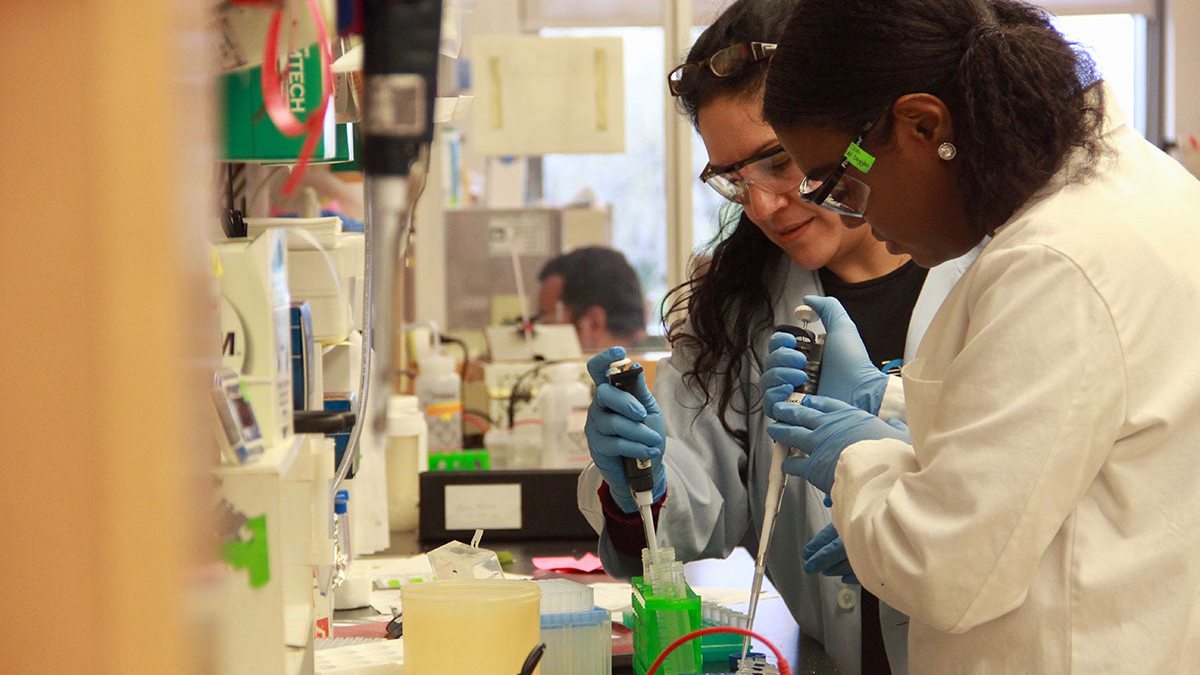From cleaning beakers to doing cutting-edge research
Sophomore Amiee Littlejohn got more than she bargained for when she took a job cleaning beakers in a lab at Carolina. Now she’s pursuing a career in cancer research.

The job description was for a lab assistant. The position called for someone to clean glassware and pick up trash — everything the seasoned researchers of Carolina’s Cook Lab needed done but didn’t have time to do.
Amiee Littlejohn, who had just graduated as valedictorian of her high school class, knew she had to start somewhere, and she was happy to start in the Cook Lab. It wasn’t exactly riveting work, but it gave the biology student access to a lab where she could observe the daily heave-and-haul of innovative research. Plus, she needed a work-study position to help pay for her first semester at Carolina.
But it quickly became more than just a job.
From humble beginnings
Littlejohn took an interest in the research of Juanita Limas, a doctoral candidate in pharmacology studying how normal cells transform into cancer cells.
“It blew my mind,” said Littlejohn, a sophomore at Carolina. “Our bodies can do so much that we don’t know about.”
So, she started asking questions: How does DNA copy itself? What is pipetting? What does it mean to be a post-doc?
Limas knew right away that there was something special in Littlejohn.
“She was asking really good questions so early in her career, and that is the sign of a very promising scientist,” Limas said. “I felt like it was kind of a waste to keep her washing dishes.”
A new challenge
Limas took Littlejohn under her wing, teaching her how to use the lab’s sterilizer and how to isolate and extract plasmid DNA. With every new challenge, Littlejohn stepped up to the plate.
“In the lab, she’s got what we call ‘really good hands,’” Limas said, “and that’s a hard skill to have because when they first start, people are often very clumsy. She also has what we call ‘ganas’ in Spanish. She has the drive or the desire to become a scientist. And I can’t teach that. She comes pre-programmed with ganas.”
It was Limas’ ganas —the sense of perseverance and drive instilled in her by her mother — that got the doctoral student to where she is today. As an underrepresented student in STEM, Limas faced challenges many of her peers never faced. With the support of faculty mentors and a refusal to take no for an answer, Limas found her way to Carolina, where she will soon earn her doctorate.
“Where I come from, I’m really not supposed to be here,” said Limas, who grew up in Des Moines, Iowa. “But I have a lot of people who have written letters of recommendation for me, who always have my back. I can’t let these people down who put their professional reputations on the line to say, ‘You need to give her a shot.’”
Now Limas wants to do the same for Littlejohn, who has also faced obstacles as an underrepresented, first-generation college student from a family of eight.
“I think mentoring an undergraduate is extremely important because it helps keep you grounded, and it really enriches you as a scientist,” Limas said. “I was always taught that whatever positive things happen to you, you always want to reach back and help the little guy coming up behind you.”
Life-changing learning
This semester, Littlejohn is assisting Limas with her research, experimenting on cells to determine exactly how they replicate and become malignant. She hopes to see her name on a publication soon. And with Limas’s help, she believes she will.
“Juanita is almost like a second mother to me,” Littlejohn said. “She has so much wisdom and advice that I could never find in anyone else. She’s very patient, very calm. What she taught me is to have perseverance and patience, and you’ll get there.”
Littlejohn, who has a family history of cancer and other diseases like diabetes, said she’s very driven and determined to tackle big questions, which Limas calls “the understatement of the year.”
“It’s really nice to just know that there are students like Aimee who are super bright, and they have huge potential,” Limas said. “The more people that we bring into the scientific enterprise that come from different viewpoints, the more we benefit. She’s given me so many different perspectives on how to approach my project, and I’ll say, ‘Oh, I never thought about that.’ That’s a good thing to have as a scientist. That’s how you push the field forward.”
And Littlejohn, who took a job in a lab for the paycheck, now sees an entirely new future ahead of her.
“I used to feel like what I do here doesn’t really matter. I’m just the person who cleans,” she said. “But when I talk to Juanita, I learn so much, and I realized I absolutely love research. It’s a newly discovered thing that I love that I never even knew I had a passion for.”




